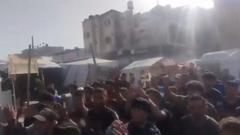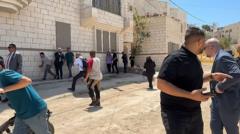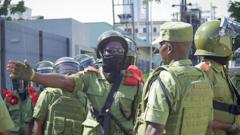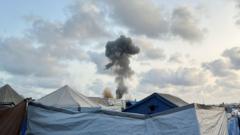As anti-Hamas protests enter their third day in southern Gaza, demonstrators voice their discontent against the armed group, risking severe consequences for public dissent amid ongoing military actions.
Growing Dissent in Gaza: Anti-Hamas Protests Continue for Third Day

Growing Dissent in Gaza: Anti-Hamas Protests Continue for Third Day
Demonstrators rally against Hamas in southern Gaza, calling for an end to the war and the group's removal from power.
Hundreds of Palestinians have taken to the streets for the third consecutive day in southern Gaza, protesting against Hamas and calling for an end to the ongoing conflict. Videos circulating on social media show demonstrators chanting, "Out! Out! Out! All of Hamas, out!" as they express their desire for the armed group to exit the region.
Activists report that the protests began on Monday, primarily led by young individuals who were later joined by others seeking food from community kitchens. Many protesters, still carrying pots, directed their anger towards Hamas's leadership following a podcast interview with senior official Sami Abu Zuhri, where he claimed that the battle with Israel was "eternal," promising to rebuild homes lost in the war and produce more offspring for every fallen martyr.
In Khan Younis, videos reveal young men openly criticizing Hamas, indicating frustration with their leadership's handling of the conflict, and expressing a desire for accountability. "To those with Hamas, be aware the people of Gaza will dig your grave," one protester declared. This marks a notable increase in public dissent against Hamas, particularly in southern Gaza, which has seen a weaker presence of protest movements until now.
Although protests against Hamas have been increasing in northern Gaza, the group has historically succeeded in suppressing public dissatisfaction in the south. International journalists, including those from the BBC, face restrictions that hinder their reporting efforts, making it difficult to gauge the true extent of anti-Hamas sentiment from a distance.
The situation is compounded by ongoing Israeli airstrikes in the region. Since Monday, the Israeli military has conducted daily bombings in Khan Younis, following one of the largest evacuation orders issued this year, compelling residents to move towards evacuation camps in al-Mawasi.
Alaa, a protest initiator who requested anonymity for safety reasons, expressed the desperation of the people amid hunger and violence. "The people do not care anymore about Hamas' attempts to suppress their voice," he stated, recounting his own cycles of displacement over the course of the 19-month war.
Amid the danger of reprisals, public dissent has led to tragic consequences in the past. For instance, 22-year-old Oday a-Rubai was reportedly abducted and later killed for participating in anti-Hamas demonstrations in Gaza City. Alaa highlighted an encounter on Monday when protesters faced intimidation from armed individuals, underscoring the risks associated with opposing the group.
Moumen al-Natour, a lawyer and co-founder of the anti-Hamas movement "We Want to Live," noted that the fatigue from displacement and the struggle to survive in Gaza is fuelling public anger against Hamas, urging a change in leadership. According to the United Nations, over 57,000 people have been displaced in southern Gaza since May, while the Hamas-run health ministry reports over 53,000 fatalities across Gaza since the conflict escalated.
The unrest follows Israel's military onslaught against Hamas, which was launched in response to a cross-border attack on October 7, resulting in significant casualties and the hostage-taking of civilians. The climate of unrest signifies a shift in the public's perception of Hamas amidst a backdrop of intense violence.





















